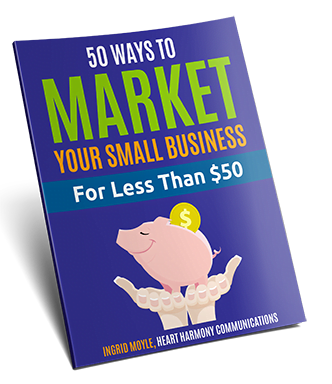Marketing your small business during recessions or tough times needs a different approach. Here’s how to market now.
We all know that tough economic times can make it challenging to market your business, especially when you have a limited marketing budget.
However, with the right strategies in place, it’s possible to navigate these tough times and find cost-effective opportunities for growth (even on a shoestring budget.)
The Psychology of Threat
Psychologically, during periods of threat, people circle the wagons, bring their attention closer to home and home events, and focus more on the family, repelling outsiders.
During tough economic times, people spend on things to beautify their home, build their family, and invest in the future. They save their money for a rainy day, and use windfalls, such as tax refunds, to pay down debt rather than fritter away on consumer items.
These are all trends that businesses need to understand and reflect in their marketing during tough times. Remember, money is still being spent … it is just being spent differently.

Small Business – Opportunity or Threat?
Let’s start with two stories from two different service-based businesses.
“The second the economy tanked all my clients stopped. I haven’t had any new clients all this week. Business is a shocker – if it keeps up, I don’t know what I will do. I will have to stop my marketing as I need to cut costs.”
“The economic downturn has been the best thing for my business ever. I have so many new opportunities – people need me more than ever to help them find their business edge. I will have to tweak all my marketing to help people feel confident again – can we revamp the lot and get it out there yesterday?”
Similar industries – same issue – very different outlooks.
During tough times, the worst thing you can do is to reduce your marketing efforts. This tells people you are giving up and you don’t think your product or service is worth the price you are asking for it.
If you are confident in the value you offer, economic downturns can be where the seeds of prosperity and success are sown. Most of the world’s biggest companies started their success from the Depression.
Recessions Are Not a Barrier
Even recessions are not a barrier to success. McKinsey & Company researched past recessions and came up with some interesting data. Of the companies that came out strongest – 83% increased their investment in their people during recession, while for those that came out weaker, only 21% increased their investment in their people. What does that mean? Well – if you were a betting person you would look at the odds and reckon there was a better chance to thrive and grow if you invested in your team than if you didn’t.
They also found that companies that did better in down economies outdid their peers on capital expenditure, research, and development, hiring great staff and buying assets as well as acquiring competitors’ businesses.
The twist is the successful companies did all these things with a strategic end in mind. They didn’t just repeat what they had done before – they looked at their new realities as well as things they could reasonably foresee and took a strategic view of investing their resources.
Many businesses read the list of what to do and then just throw money at it. Smart businesses look at the list of what to do and then stop to work out what will work best for them, in their industry, with their conditions, with their organisational culture and their leadership team.
10 Things to Remember When Marketing During Tough Economic Times
1. Build your trustworthiness
In tough economic times, you need to increase your credibility before people will trust you enough to spend with you.
You need to be inside the wagons, not outside. This means you need to increase your social proof that you are trustworthy and have a great product.
Encourage satisfied customers to spread the word about your business. Offer referral incentives to encourage existing customers to refer their friends and family. Word-of-mouth marketing is powerful, and it doesn’t cost a cent.
This is also the time to go back and get all of those testimonials you have been meaning to get. Include testimonials on your website and your marketing material to ensure people know you have a proven successful track record.
2. Focus on building relationships
When the economy is stagnant, people want more than ever to know and trust the person they will work with.
Get out there, meet people, and form strong business relationships with them. Don’t hide away in your office. Be active on social media and personally demonstrate your expertise.
Collaborate with complementary businesses or local organisations to cross-promote each other’s products or services. Explore opportunities to participate in community events or sponsor local initiatives. This allows you to expand your reach and tap into new customer bases without significant financial investment.
Also, ensure you maintain brilliant relationships with your existing clients to reduce the risk that they will leave for a cheaper option.
3. Demonstrate massive value for money
During tough times, people need a strong reason to spend their money. They need a bigger emotional “why,” backed up by logical reasons as to how this purchase supports their values or needs.
If your sales are sluggish, you are not demonstrating enough potential value to customers.

Start by reviewing your marketing copy and graphic design to ensure you are articulating the true value that you add to clients.
During tough economic times, customers are often more price sensitive.
Consider add-on products or services with a low cost to you, but have a high perceived value. Create special promotions, discounts, or bundled packages to incentivise purchases.
You can also consider swapping coupons and offers with other related businesses in your local area. For example, if you are a gym, offer coupons for a free class at the coffee shop in your centre. The coffee shop can offer a coupon for a free coffee to be handed out at your gym.
Ask your clients:
- what value they believe you added to their business and
- what other goods or services they would have liked to see you add.
Often your clients will give you your best clues in terms of things you did that they felt added value to their business – things you didn’t realise were important. They will also give you great ideas for bonuses and add-on services – if you ask them.
4. Test everything
The old ways are no longer working for many businesses. You do need to monitor your statistics for each campaign – if a brochure, flyer, or ad isn’t getting you the results you were looking for then adjust it and explore different strategies such as ads on social media rather than traditional print media spending.
You still should be getting a strong return on investment for each campaign. Even during tough times, campaigns need to show a ROI.
5. Dust off your database
Your previous clients all know your services and offerings. Make sure you go back and touch base with all previous clients (even the ones you haven’t spoken with in some time).
These people are more willing to buy from you than new customers – so treat them like gold and with great respect.
6. Revisit your guarantee
You need strong guarantees for your goods or services. When marketing during tough times you may want to strengthen your guarantee. Instead of 30-day money back guarantee make it a 90-day or 120-day money back guarantee.
7. Don’t scrimp on good graphic design and printing
It’s very tempting to DIY using Vistaprint or running your own brochures up. Professional graphic design is just that – professional! It looks great and gives you a professional brand and image. Don’t cut corners with your design and printing – this is false economy.
8. Stay positive
If you think the sky will fall – it will. If you think you will be successful – you are more likely to be. Find positive, empowered people and hang out with them. Don’t stay too long with naysayers, as they will drag you down into their dark space.
This also means don’t cut your prices in a vain attempt to stay afloat as that sends the message that you are desperate. You need to correctly value your goods and services otherwise you will send yourself broke not being able to cover your costs.
9. Boost your communication
This is the time to increase your communication to customers – not reduce it. Keep it informative, credible, and upbeat. Don’t get tempted to fall into doom and gloom for your headlines or marketing messages.
10. Reinforce your strong online presence
During tough economic times, people spend more time researching before investing or buying. In the online world, everything starts with your website.
A professional website can help you to reach more customers, showcase your products or services, and build trust and credibility in tough economic times.
Make sure your website is information rich, is mobile friendly, has been optimised for search engines, and is easy to navigate.
If your website is dated, then it is time for a refresh!
Conclusion
Despite tough economic times, you can still thrive with effective marketing strategies. Remember, success lies in finding creative solutions, utilising free or low-cost resources, and adapting to the evolving needs of your target audience.





